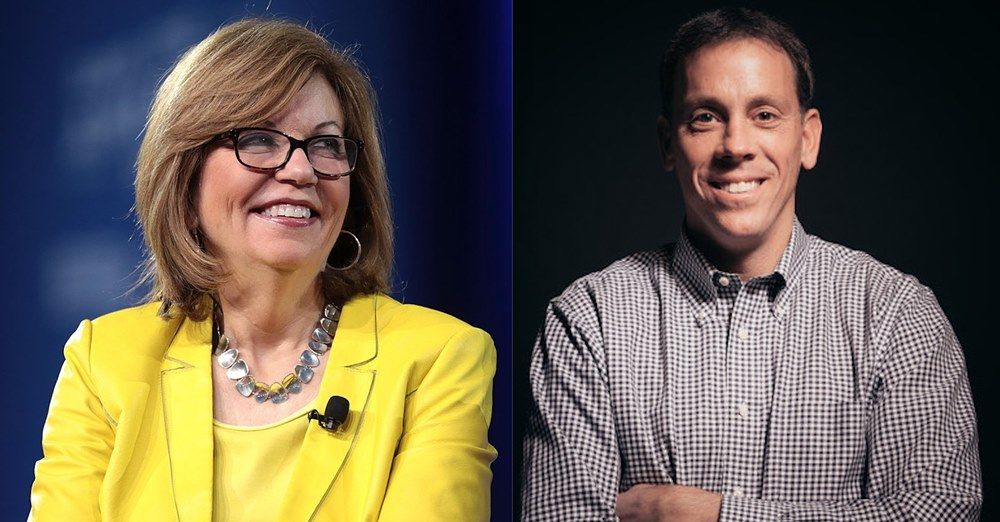The transition of power from President Donald Trump to President-elect Joe Biden will be unlike any other in modern America history and is likely to lead to significant turmoil, two of the nation’s top political journalists said in a Nov. 9 virtual town hall meeting hosted by South Dakota News Watch.
Susan Page, Washington bureau chief for USA Today, and Jim VandeHei, co-founder and CEO of the news website Axios, said that Americans need to brace for a rocky couple of months as Trump, a Republican, appears unwilling to concede the election and Biden, a Democrat, plans to reverse many Trump administration policies.
Page and VandeHei spoke as part of the virtual town hall meeting, “The 2020 Election: What Just Happened?”, hosted via Zoom by South Dakota News Watch. News Watch co-founder and co-chair Jack Marsh moderated the one-hour discussion that covered the unprecedented 2020 election and the challenges Biden is likely to face as he prepares to take office in January 2021.
The 2020 presidential election was held during a global pandemic, saw record numbers of people vote early or by mail and shattered overall voter turnout records. The election results were also unconventional. Biden won the presidency, but he will be the first Democratic president since Grover Cleveland in 1885 to take office without also carrying his party to majorities in both chambers of Congress, Page said.
Defying convention has been a hallmark of the Trump administration. That is unlikely to change just because he lost an election, Page said, pointing to the Nov. 9 firing of Defense Secretary Mark Esper. The secretary of defense is a key cabinet position and would be an essential part of the transition process even if America was not still at war in Afghanistan, Page said. Removing Esper could complicate the transition process, she said.
“We don’t know if there are more firings on the horizon before (Trump) gets out of town, we don’t even know that he’ll voluntarily leave town since he has not yet acknowledged that he lost the election,” Page said.
Trump is unlikely ever to admit that he lost the 2020 election, said VandeHei, the co-founder and former editor of Politico.
“I think he’ll forever say that this election was stolen, that he was a victim of media bias,” VendeHei said. “And I think 40% or more of the country will agree with him.”


The president’s refusal to accept defeat, coupled with the silence of many key Republican leaders on the election result, will likely serve to polarize the American people further and disrupt what is already expected to be one of the most important and complicated presidential transitions in history.
Not only is the U.S. facing a pandemic that has killed nearly 240,000 people, but there are substantial foreign policy challenges to face, including a changing climate. Meanwhile, the national economy needs to recover from the devastation caused by COVID-19, the speakers said. On top of all that is a ballooning federal budget deficit, VandeHei said.
“There are just so many things, and on any one of these, you could say, ‘Oh, my gosh, I could spend my whole presidency on this and only tinker around the edges,’” VandeHei said. “God bless him [Biden]; this will be a tough one.”
One of the things Biden has going for him is that he is a fairly moderate Democrat, VandeHei said. The president-elect has shown some trepidation about his party’s extreme left wing and has a history of working with Republicans while a U.S. senator.
“In some ways, Joe Biden is the right person to run the country right now, in terms of the Democratic Party, to run the country because I do think he understands intuitively some of the grievances that 50% of the country feels,” VandeHei said. “I think he knows that the country is not ready to move as far as his party wants to move.”
One of the big surprises to come out of the 2020 election was just how well Trump and the Republican party he has led for four years fared, despite polls showing big leads by Biden. Both VandeHei and Page acknowledged that the national press and polling firms missed something about how voters view Trump.
“I’ve never seen so many people take money out of their own pocket and paint a president’s name on their boat or their truck or their house,” VandeHei said. “Something was happening out there where he became almost a fashion statement and an identity statement and a cultural statement that we should have been able to pick up on more perceptively and collectively.
Another unique factor about covering President Trump and the 2020 election is Trump’s loose relationship with facts, the speakers said.
Reporters struggled early during Trump’s tenure in office with his frequent stretching, bending or outright disregard of facts, Page said. News organizations were forced to beef up their ability to fact-check the president quickly and fairly. During the election and now during the transition, there has been a constant struggle to challenge the president when he misstates a fact while at the same time remaining objective.
“That’s one of the ways in which we responded, but of course, with the erosion of trust in the news media, there are a lot of people who simply don’t believe us when we do fact checks,” Page said.
Part of the reason trust has eroded in the news media, VandeHei said, is that so many of the nation’s best political reporters can be found on Twitter being very clear about which side of the political aisle they identify with and who they are cheering for.
“I’ve said this before and I’ll believe it, I think, now forever; Twitter might have destroyed journalism or a big piece of it,” VandeHei said.
How to watch the town hall
A full recording of “The 2020 Election: What Just Happened?” can be found on the South Dakota News Watch Facebook page or at this link on YouTube.




